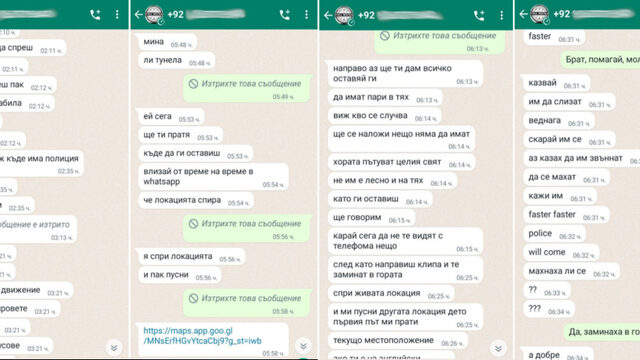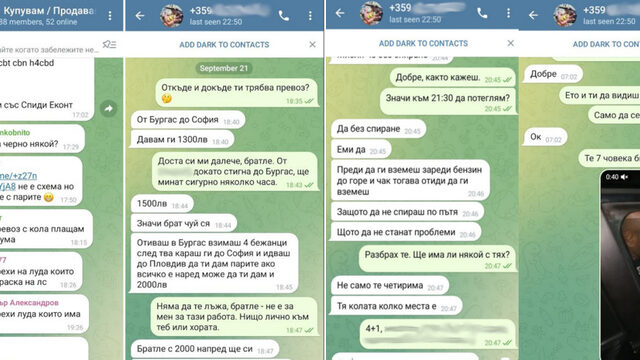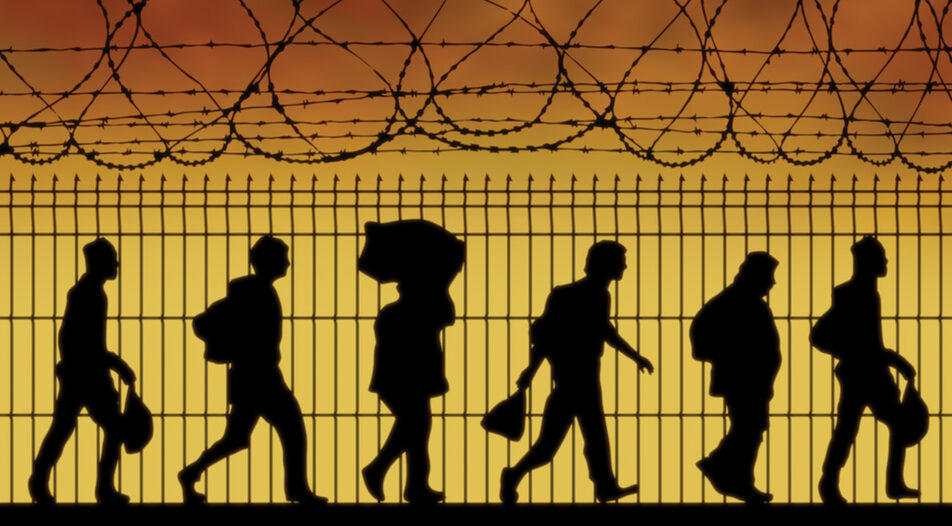Vladislav (editor's note: the name has been changed) does not lead a particularly turbulent life. He lives in a town in northeastern Bulgaria, where he works shifts in a factory. Sometimes it is this monotony, topped with dissatisfaction with his financial situation, which makes him do things far beyond his daily routine, and in this case, beyond the law. At the end of 2023, Vladislav became a trafficker of illegal immigrants through an ad in a channel on the anonymous chat application Telegram. In practice, he was one for only a single day: out of the three trips he made to pick up refugees near the Turkish border, only one was successful.
Vladislav's story begins on 21 September, when he saw a message from the Telegram user Dark Hacker in the "Buy/Sell (BG)" channel on Telegram. Unlike almost everyone else in the channel, who offer different types of drugs, Dark Hacker writes a short message that says: "Someone - transport by car, I pay a large sum." This is enough to pique Vladislav's interest, who writes to him for more details. Dark Hacker replies immediately, offering BGN 1300, then BGN 1500, and finally BGN 2000 to transport four refugees from Burgas to Sofia.
"I thought about it, but the amount was really tempting. I hesitated several times, I thought about it, but in the end the amount was significant for me," Vladislav told Capital weekly. His story is important because it shows that migrant trafficking is changing and no longer relies only on professional smugglers, but also on buccaneers who just want to make money. Finding such "one-time smugglers" is done in a very public way - in internet chats that anyone can enter.
"Buy/Sell (BG)" (or buyandsellbg) is one of several large public channels on Telegram where, among drug ads, refugee smugglers are also sought. Another is Dark Market Bulgaria (pazarananaroda). Like all channels on the app, they are free to access by all users and the rules there are set entirely by their individual administrators, not the company behind Telegram.
Vladislav contacted Capital weekly with an offer to tell his story. Initially, we were suspicious of his account, but after a long exchange of emails and conversations that lasted over two months after the first message, the editorial team received enough evidence and details to corroborate his story: Vladislav recounts in detail what happened, provides full correspondence with the organizers, one of whom writes from a number to a mobile operator in Pakistan. To these he adds a video of the refugee count, which the organizers demand as proof of the work done, and the exact coordinates of all the places from which he had to pick up and drop off migrants.
Vladislav has repeatedly confirmed to Capital weekly that he is aware of the risk he is taking, and provides his story with the only condition that his name be changed in the article, and that the city where he lives be omitted.
"If they get you, they get you"
After agreeing to the offer to transport refugees, Vladislav set off almost immediately for Burgas shortly after 9:30 pm on 21 September. The directions are relatively simple - pick up the four refugees, then drive straight to Sofia, without stopping. There are also two conditions: that a video of the migrants is taken upon arrival in Sofia, and that he constantly sends screenshots of his location so the organizers know where he is.
At first Vladislav doesn't receive a specific location to get to. He drives to Burgas, and then around 22:50 he gets the exact coordinates where he has to go to pick up the refugees. The location is a dirt track in Strandja, between Krushevets and the Yasna Polyana dam.
When he gets there, Vladislav sees the light of flashlights on phones. "The first refugee appeared - with dark clothes, a backpack on his back, a shaved head, a slightly scraggly beard and mustache. Apparently they knew of my arrival by my location, and after a hand wave from him and words in a language unknown to me, six more people appeared," Vladislav says. Instead of the intended four people, the refugees numbered seven. This is a problem for Vladislav, whose car is a five-seater sedan. In the end, five of them sit in the back and two in the front seat next to the driver, and the car sets off for Sofia.

As he heads to the Strandzha, Vladislav receives directions that a second person will be joining the communication, this time through the WhatsApp app, which allows for constant location sharing. The number starts with +92, which corresponds to the code for mobile numbers in Pakistan, but the correspondence is in Bulgarian and the language on the other side is conversational, not formal as it would be if the words were going through a translation app.
Communication with the migrants in the car is difficult. Only one of them knows any English. "They weren't even talking much to each other, just taking selfies with their phones and enjoying themselves," Vladislav says. From his few conversations with them and through translation apps on their phones, Vladislav understands that they are from Afghanistan; their next stop is Serbia, and their final destination is Germany. They have paid 3,000 euros per person for their passage through Bulgaria. Vladislav adds that he doesn't know what was in their luggage, but it strikes him that all of them had iPhones, as was obvious because of the Apple logo.
After passing through Plovdiv, he gets the coordinates of his final destination - a location on the Ring Road in Sofia, near the village of Chepintsi. Vladislav says he was tense during the journey, and the directions he received were very general - for example, to drive behind a truck and to monitor via the Waze app where other users had noted that they had seen police. The strategy if stopped by police is simple: "If they get you, they get you."
"Nothing can go wrong"
Initially, Vladislav expects to receive half the amount from the refugees themselves - 500 euros. On arrival in Sofia and shortly before they finally get out of the car, he receives other instructions - not to take money from the refugees because they might need it for the rest of the journey to Germany. "It's not easy for them either, when you leave them we will talk," the man behind the Pakistani number wrote.
After the migrants leave his car, there is a new twist - Vladislav has to wait for another person in the scheme, who was supposed to pay him, but was asleep at the time. So he goes to a parking lot in Sofia to try to sleep. When he doesn't succeed, he contacts the Pakistani number again, who explains to him that the "man with the money" is not up yet, "but it's all right", "no problem" and "no big deal". Vladislav replies sarcastically, "what a coincidence, nothing is going my way."

Nevertheless, the organizer continues to claim that everything is fine. Subsequent communication with both the Bulgarian and the Pakistani number makes it clear that the two organizers do not actually know each other and the coordination takes place elsewhere. The suggestion from the Bulgarian number was for Vladislav to go through Plovdiv to get his money, but by that time he had already left for his hometown.
At this point, Vladislav has serious doubts, but he hasn't completely lost hope that he'll see the money he's owed - at least neither of his two contacts has stopped responding. So when, over the next few days, he receives several offers to do a second pickup, and for even more money - for example, four people at 500 euros each - he agrees to one of them, on the agreement that after this trip he will receive the remaining 1,000 euros he is owed.
On his second journey, which is to a place close to the first, Vladislav is lost. The reasons are that his phone loses range and he has no connection to either the GPS app or his contact. Eventually, after hours of wandering and a crash into a muddy rut, he leaves on his own. "Strangely for me, the organizer showed understanding and when we got in touch, he asked me if I got home safe and sound."
This second empty run was followed days later by a third, this time with a different end point - a few kilometers from the Lesovo checkpoint in the Yambol region. From there he has to pick up five migrants, whom he calls by name upon arrival. When no one appears, Vladislav talks to his contact. He tells him that he will still get BGN 500 for the empty pickup and another 1,000 euros from "the Arab who organized the trafficking thing", who was unhappy that the migrants themselves had not turned up. Shortly before leaving, however, Vladislav has to deal with other people - two border police officers.
"People just like me"
Vladislav's stop by police officers is not particularly surprising because unlike the first two locations, the third is in a much more visible spot near a border crossing. "They took my phone and went through my last correspondence with the organizer, asked for ID and searched my car completely. I told them it was my first time. I would say they were definitely professional and knew what they were doing, they offered me two options - either to cooperate with them or to be arrested," says Vladislav, who chose to cooperate with the police.
The problem was that he didn't have that much to assist them with. There were no refugees in the car and therefore no crime to arrest him for at this moment. His correspondence with anonymous numbers did not help the police much either. They therefore warn him that if he is caught with migrants he could receive an effective sentence. "There's one thing they guessed for sure - that I won't get a single lev from the whole thing," Vladislav says. "I didn't have many options and headed back home."
When he got back home, Vladislav quickly gave up his career as a trafficker, which was not very fruitful - out of three trips he made, only one was successful. His financial situation turned out to be worse than when he started, because on two of his runs he received no money for fuel. In total the whole story lasted for about a week.
In his final conversation with Capital weekly in December, Vladislav says that he has long lost all hope of seeing any money. In retrospect, he realizes that he was naive to expect money after the first trip was not paid, and that he repeatedly put himself in danger. Since his return, he has been scrolling the Telegram feeds again, where he continues to see multiple ads for refugee transport hidden amongst the even larger plethora of ads for drug sales, topped off with offers of fake perfume and even more fake diplomas.
"What I notice now, but didn't notice then, is that it's full of people like me - people who have transported migrants, but who had never been paid. Now I, like them, occasionally go in and warn other people not to get caught," he concludes.
Vladislav (editor's note: the name has been changed) does not lead a particularly turbulent life. He lives in a town in northeastern Bulgaria, where he works shifts in a factory. Sometimes it is this monotony, topped with dissatisfaction with his financial situation, which makes him do things far beyond his daily routine, and in this case, beyond the law. At the end of 2023, Vladislav became a trafficker of illegal immigrants through an ad in a channel on the anonymous chat application Telegram. In practice, he was one for only a single day: out of the three trips he made to pick up refugees near the Turkish border, only one was successful.
Vladislav's story begins on 21 September, when he saw a message from the Telegram user Dark Hacker in the "Buy/Sell (BG)" channel on Telegram. Unlike almost everyone else in the channel, who offer different types of drugs, Dark Hacker writes a short message that says: "Someone - transport by car, I pay a large sum." This is enough to pique Vladislav's interest, who writes to him for more details. Dark Hacker replies immediately, offering BGN 1300, then BGN 1500, and finally BGN 2000 to transport four refugees from Burgas to Sofia.












